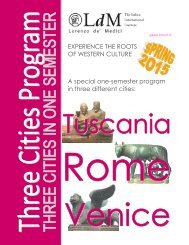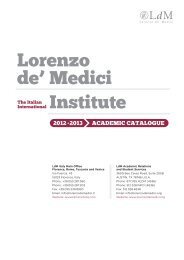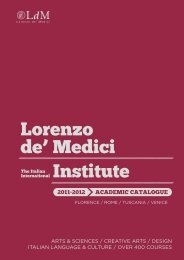aCademiC Catalog 2013-2014 - Lorenzo de Medici
aCademiC Catalog 2013-2014 - Lorenzo de Medici
aCademiC Catalog 2013-2014 - Lorenzo de Medici
You also want an ePaper? Increase the reach of your titles
YUMPU automatically turns print PDFs into web optimized ePapers that Google loves.
esources and pollution, and habitat loss. The course intends<br />
to introduce stu<strong>de</strong>nts to ecological concepts that provi<strong>de</strong> a<br />
foundation for un<strong>de</strong>rstanding present and future environmental<br />
issues and for them to learn about critical environmental issues<br />
such as population growth, natural resource management,<br />
biodiversity and global changes, wil<strong>de</strong>rness, food production<br />
and changing habitats.<br />
Natural Resources Management in Italian<br />
Society<br />
ENV 220 F<br />
Cr: 3; Contact hrs: 45<br />
The course aims to study the origin of the earth’s main energetic<br />
natural resources, and the way they have been managed<br />
throughout the centuries up to mo<strong>de</strong>rn days. Each natural<br />
resource covered will be introduced by a <strong>de</strong>tailed scientific<br />
overview. This will be followed by an examination of the<br />
evolution of the resource’s management by humankind through<br />
a historical and geographical analysis. Practical examples will be<br />
explained, especially in regard to the current Italian situation as<br />
well as with a glance back at the fundamental episo<strong>de</strong>s which<br />
have tied the energy sources’ study with human evolution.<br />
During class times, discussions about the environmental impact<br />
of natural resource <strong>de</strong>velopment and management will be held.<br />
Tuscany and its Environment<br />
ENV 230 F<br />
Cr: 3; Contact hrs: 45<br />
Particular emphasis is given to the relationship between the<br />
geography and history of the region, from the Etruscans, the<br />
first inhabitants of the area, to mo<strong>de</strong>rn Tuscany. We will focus<br />
on the rural heritage of Tuscany, in particular on its influence on<br />
the society and economy of the region. In the second part the<br />
course we will focus on the main geographical, historical and<br />
cultural features of Tuscan cities (Florence, Siena, Arezzo, Pisa,<br />
Livorno and Lucca) and on the relevant geographical areas<br />
or the region (Mugello, Casentino, Garfagnana, Apennines,<br />
Chianti and Maremma). The main economic characteristics<br />
(craftsmanship, industry and tourism) of the region will be<br />
highlighted. The last part of the course is centered on the<br />
importance of the perception of Tuscany and of Tuscan<br />
landscapes by English-speaking cultures from the 19th century<br />
onwards.<br />
Sustainable Food<br />
ENV 280 F; Dual listed: NUH 280 F<br />
Cr: 3; Contact hrs: 45<br />
This course explores food and gastronomy in the light of<br />
environmental preservation, sustainable agricultural practices,<br />
the conservation of biological and culinary diversity and<br />
global justice. Drawing on a multi-disciplinary perspective<br />
which brings together aca<strong>de</strong>mic research and the traditional<br />
knowledge of farmers and producers, stu<strong>de</strong>nts will explore the<br />
complexity of food and food systems through an analysis of<br />
their nutritional, social, and environmental aspects. They will<br />
be encouraged to reflect on the sustainable food movement in<br />
a holistic manner, and to question the roles of individuals and<br />
consumers in today’s global food system.<br />
History<br />
Western Civilization<br />
HIS 130 F<br />
Cr: 3; Contact hrs: 45<br />
Survey of cultural, social and political <strong>de</strong>velopments in the<br />
western tradition between its origins in the Ancient Near East<br />
and the present. Themes inclu<strong>de</strong>: the Ju<strong>de</strong>o-Christian and Greco-<br />
Roman heritages, medieval to mo<strong>de</strong>rn Europe, nationalism,<br />
industrialization, western imperialism, totalitarianism and<br />
two World Wars, challenges of the later 20th and early 21st<br />
centuries.<br />
European History I: Antiquity to French<br />
Revolution<br />
HIS 150 F<br />
Cr: 3; Contact hrs: 45<br />
The course will explore the vast physical, social, political and<br />
mental changes that occurred in European societies from the<br />
rise of Mediterranean civilization until the French Revolution.<br />
This long-term perspective will help stu<strong>de</strong>nts to un<strong>de</strong>rstand<br />
the turning points in European history and the historical roots<br />
of contemporary European states. Particular attention will be<br />
<strong>de</strong>voted to the influence of Roman civilization on subsequent<br />
European empires and states. The evolution of Europe’s external<br />
relations will be another key topic of the course. The imperial<br />
expansion of Rome, the barbaric invasions, the Crusa<strong>de</strong>s and<br />
finally the new forms of European colonialism will be analyzed<br />
and explained. The third main theme of the course will be the<br />
process of nation building in mo<strong>de</strong>rn Europe, the rationale<br />
for the rise of nations and empires and the dynamics of the<br />
new system of states and international relations that appeared<br />
with the so-called Ancien Régime. This part of the course will<br />
provi<strong>de</strong> stu<strong>de</strong>nts with a very important tool for un<strong>de</strong>rstanding<br />
contemporary Europe and elements of historical methodology<br />
as well as elements of political theory which will be useful for<br />
other courses on European history and politics.<br />
European History II: French Revolution to the<br />
Present<br />
HIS 155 F<br />
Cr: 3; Contact hrs: 45<br />
The course explores the major <strong>de</strong>velopments in society, politics,<br />
culture, and outlook in Europe between 1789 and the present.<br />
Themes inclu<strong>de</strong> the French Revolution, technological and<br />
i<strong>de</strong>ological revolutions of the nineteenth century, nationhood<br />
and national problems (some still unsolved), the two World<br />
Wars, and the difficult path to contemporary united Europe. The<br />
values of the French Revolution (liberty, equality, brotherhood)<br />
affected European history in an unprece<strong>de</strong>nted way, partly<br />
through Napoleon’s empire. The rise of new i<strong>de</strong>ologies<br />
including liberalism, socialism, imperialism, and nationalism<br />
changed the shape of Europe forever, as did the upheavals of<br />
the Industrial Revolution. We will relate totalitarian regimes<br />
(chiefly Bolshevik Russia, Fascist Italy, and Nazi Germany) to<br />
the origins and aftermath of World War II. The postwar balance<br />
of world power forced European nations to re<strong>de</strong>fine their<br />
i<strong>de</strong>ntities and global roles. If the Cold War, symbolized by the<br />
Berlin Wall, expressed <strong>de</strong>ep breaches within Europe, today’s<br />
European Union represents a new approach to overcoming<br />
national divisions through political and economic integration.<br />
This course provi<strong>de</strong>s tools for un<strong>de</strong>rstanding contemporary<br />
Europe, and elements of historical methodology and political<br />
theory useful for further study of European history and politics.<br />
Ancient Rome<br />
HIS 200 F; Dual listed: CLA 210 F<br />
Cr: 3; Contact hrs: 45<br />
This course offers a comprehensive introduction to the history<br />
and growth of the ancient Roman empire from the early<br />
settlements in Latium, through the republican and imperial<br />
periods, to the formation of a new Roman world after the crisis<br />
of the 3rd century. A series of themes and issues will be explored:<br />
the range of primary sources available for ancient history;<br />
the political organization of the Roman state; the territorial<br />
expansion and its influence on the cultural and administrative<br />
sphere; Roman religion and the spread of Christianity; the<br />
Roman frontiers and the barbarian populations; and the end<br />
of the Roman world and the birth of a new society. In or<strong>de</strong>r<br />
to stimulate stu<strong>de</strong>nts’ critical skills in observing historical<br />
phenomena, a problem-oriented approach will be supported<br />
by readings of primary sources. Stu<strong>de</strong>nts will also have the<br />
chance to observe different approaches to un<strong>de</strong>rstanding<br />
the past and will <strong>de</strong>velop a sense of the role of historians and<br />
history in society.<br />
Medieval Civilization and Culture<br />
HIS 212 F<br />
Cr: 3; Contact hrs: 45<br />
This course explores the remarkable series of transitions<br />
that Western civilization un<strong>de</strong>rwent between the years 313<br />
and 1400 CE, dates corresponding to Emperor Constantine’s<br />
official acceptance of Christianity, and the imposition of<br />
humanistic culture. In culture, politics and society, this long<br />
period witnessed a reorientation of values and enormous<br />
School of Arts & Sciences FLORENCE<br />
LdM Aca<strong>de</strong>mic <strong>Catalog</strong> <strong>2013</strong>-<strong>2014</strong><br />
63





